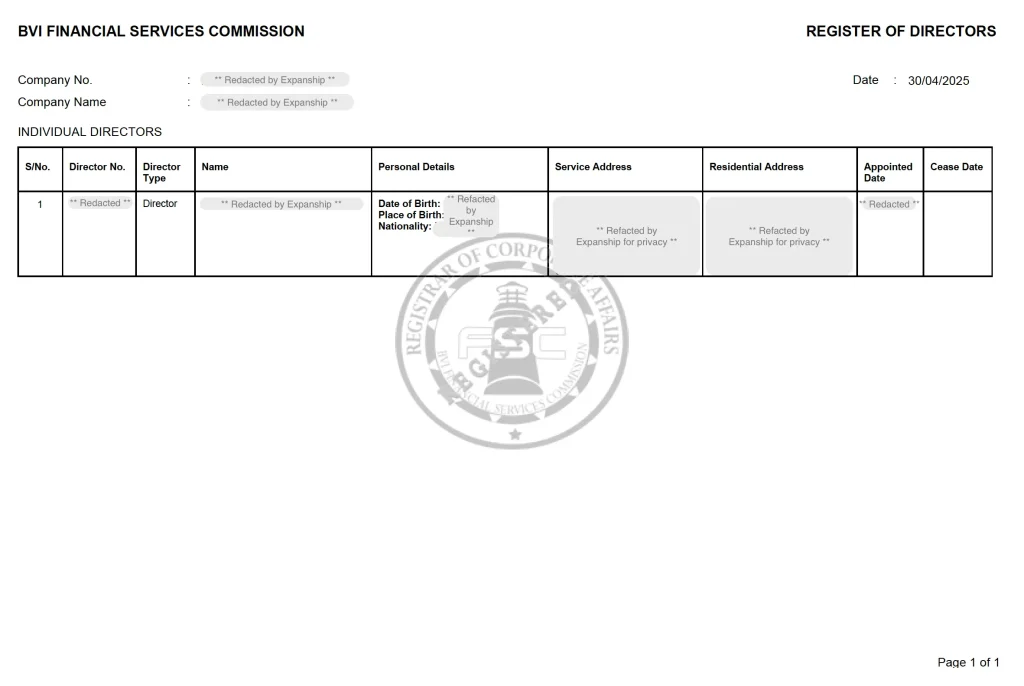Directors form the core of every BVI company’s governance, holding the responsibility of managing the company’s affairs. In the British Virgin Islands, maintaining a BVI Register of Directors isn’t just a good practice—it’s a statutory obligation. Banks, investors, and regulators routinely request access to a company’s register of directors when verifying the legitimacy of its governance structure.
For example, when opening a bank account or applying for a license, one of the first documents institutions ask for is the BVI Director Register. This isn’t without reason. A properly filed and maintained register demonstrates that the company operates transparently and in compliance with the BVI Business Companies Act, 2004.
In this blog, we’ll explore the purpose, content, filing rules, privacy protections, and compliance penalties associated with the Register of Directors for BVI companies.
Table of Contents
What Is the BVI Register of Directors?
The BVI Register of Directors (ROD) is a formal document that records key information about a company’s directors. All BVI-incorporated companies are mandated to prepare this register and submit it to the Registrar of Corporate Affairs.
The register serves to:
- Confirm who is responsible for managing the company
- Provide official documentation for compliance and due diligence
- Support issuance of other important documents like the Certificate of Good Standing and Certificate of Incumbency
Financial institutions, payment processors, and regulators frequently request the ROD to understand the directorship structure and ensure the company is operating lawfully.
Having maintained director registers for our clients, we’ve seen how critical this document is in confirming company governance. Many first-time founders assume internal records are enough, but BVI law mandates formal submission to the Registry under Section 118.
Who Must File a Register of Directors in the BVI?
Every BVI company—regardless of its business activity, revenue, or number of directors—must file its Register of Directors. This includes:
- Newly formed companies
- Dormant entities
- Single-director companies
The filing is mandatory whether the company is active or not.
Where Must the ROD Be Filed in the BVI?
The register of directors must be filed with the BVI Registry of Corporate Affairs via the company’s registered agent, who serves as the intermediary between your company and the Registry. This filing ensures that there is an official record held by the government.
Where Must the Directors Register Be Maintained?
The original BVI Register of Directors must be maintained at an address that has been officially disclosed to the Registry. This location can be either located physically within the British Virgin Islands or anywhere else in the world, as determined by the directors.
Most importantly, a copy of the Register of Directors must always be maintained at the company’s registered office in the BVI. Your BVI Registered Agent, as part of their statutory duties, will take care of maintaining this copy for you, ensuring it is readily accessible for regulatory inspection if required.
When Must the ROD Be Filed?
For newly incorporated BVI companies, the deadline for appointing the first director(s) and filing the Register of Directors with the Registry of Corporate Affairs is 15 days after the date of incorporation.
Penalties for Late Filing of the Register of Directors
Failure to file the BVI Register of Directors or its subsequent amendments within the stipulated timeframes can lead to significant financial penalties imposed by the Registry of Corporate Affairs. Here are the penalties for late filing:
- 1st Month Late: US$300
- 2nd–3rd Month: US$350 per month
- 4th–6th Month: US$400 per month
These penalties can accumulate quickly, so timely compliance is essential.
Government Filing Fees
The official filing fees set by the BVI FSC for filing a director register are:
- Initial Filing Post-Incorporation: US$100
- Amendments Filed Within 30 Days: US$50
- Amendments Filed After 30 Days: US$150
Information Contained in the Register of Directors
The Register of Directors ensures a transparent and traceable history of the company’s management. Each entry will include the following details:
- Company Name
- Company Number
- Date of ROD Filing
- Director Number (unique identifier)
- Director Type
- Full Name
- Date of Birth
- Place of Birth
- Nationality
- Service Address
- Residential Address
- Date of Appointment
- Date of Cessation (if applicable)
These details will be present for all directors, encompassing both those currently serving the company and all past directors, providing a complete historical record of the company’s leadership.
Sample of a Real-Life Register of Directors
Below is a sample stamped Register of Directors issued for a real BVI company. It provides a clear view of how the information is structured and presented in an official format.

Is the BVI Director Register Public?
Unlike in some jurisdictions, the BVI Register of Directors is not publicly accessible online.
However, third parties can request access to the filed version via the BVI FSC. What is visible? Only the names of the directors—no personal details such as address, nationality, or date of birth—are included in the publicly available extract. This feature is commonly used during BVI Company Director Searches, especially by legal firms or investors.
The full version of the register of directors may be accessed by specific BVI authorities (e.g., FSC, Financial Investigation Agency) or via court order.
How to File a Register of Directors
Filing is typically handled by your registered agent and involves the following steps:
- Step 1: Draft and sign the ROD with all required details.
- Step 2: Submit the director register to the BVI Registry of Corporate Affairs.
- Step 3: Receive an officially stamped copy of the ROD for your records.
If you’re working with Expanship, we ensure this process is handled promptly, including reminders for any updates.
Filing an Updated Register of Directors
Any changes to the directorship or their information must be reflected in an updated ROD and filed with the Registry within 30 days. Common scenarios include:
- Appointment of a new director
- Removal or resignation of a director
- Changes to director’s personal details (address, nationality, name, etc.)
- Correction of previously filed data
Steps for Amending a BVI Register of Directors:
- Notify the registered agent of changes
- Draft the ROD with all required details within 30 days to avoid penalties
- Submit the signed draft to the BVI Registry of Corporate Affairs.
- Receive an updated stamped ROD from the Registry.
Late filing of updates triggers additional penalties. In cases of factual errors or disputes, a court-ordered rectification of the register is also possible.
BVI Nominee Directors and Privacy Considerations
A BVI Nominee Director is an individual or corporate entity appointed to act as a director on behalf of a beneficial owner, often to preserve privacy. These appointments must still be disclosed in the ROD.
If a licensed nominee director service provider appoints a director, the register must include the identity of the individual or entity on whose behalf the director is acting. This adds an additional layer of transparency.
While the BVI protects director privacy compared to some jurisdictions, companies must still maintain accurate records and be ready to disclose them to regulators, banks, or courts when required.
Frequently Asked Questions (FAQs)
-
What is the BVI Register of Directors?
It’s a statutory register listing all current and past directors of a BVI company, filed with the Registrar of Corporate Affairs.
-
Is the register publicly accessible?
Only the names of directors are available upon request from the BVI FSC. Other details remain confidential.
-
Who is required to file it?
All BVI-incorporated companies must file their register within the legal deadlines.
-
Can nominee or reserve directors be included?
Yes. Nominee and reserve directors must be disclosed, including relevant third-party information if appointed by a licensed provider.
-
What happens if I don’t file or update the register on time?
You’ll incur escalating penalties ranging from US$300 to US$400 per month depending on the delay.
Conclusion
The BVI Register of Directors is much more than an internal record—it’s a legal obligation and a foundational element of corporate governance. Filing it accurately and on time demonstrates transparency, helps meet compliance standards, and prevents regulatory issues or banking delays. Whether you’re incorporating a new BVI company or updating your board structure, staying compliant with ROD requirements is essential to maintaining your company’s good standing and credibility in the eyes of institutions and investors.

